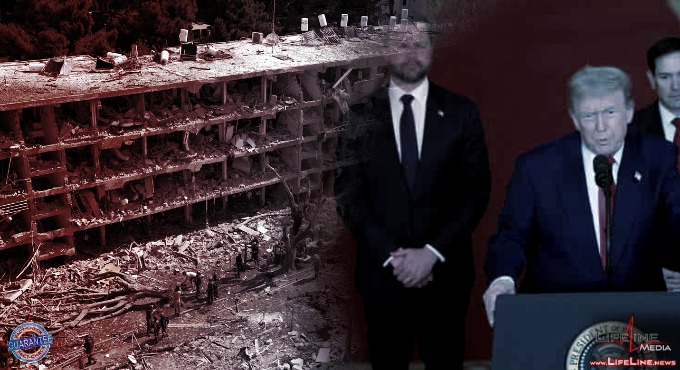Unveiling the Dangerous Fallout that Could Spark a Wider Middle East War

FACT-CHECK GUARANTEE
Political Tilt
& Emotional Tone
The article presents the U.S. and Israel’s military actions as justified warnings against Iran’s nuclear ambitions, reflecting a center-right bias supportive of Western intervention.
Generated using artificial intelligence.
The tone conveys a serious and tense atmosphere with emphasis on conflict, danger, and escalating violence, resulting in a slightly negative emotional tone.
Generated using artificial intelligence.
Updated:
Read
In a move that has stunned diplomats and rattled global markets, the United States has bombed three Iranian nuclear facilities, thrusting itself directly into the heart of the escalating conflict between Israel and Iran.
The world is now watching closely as the volatile situation threatens to erupt into a broader regional war.
The American strikes, carried out with bunker-busting munitions, targeted hardened sites at Fordo, Natanz, and Isfahan. These attacks follow weeks of mounting tit-for-tat violence between Israel and Iran.
Israel had already escalated the conflict by launching airstrikes deep inside Iran, targeting not only military infrastructure but also senior commanders and nuclear scientists. In response, Iran unleashed waves of missiles, drones, and rockets toward Israeli cities, causing casualties, destruction, and widespread fear among civilians.
With the U.S. now directly bombing Iranian territory, the conflict has entered uncharted territory. American officials insist these strikes serve as a clear warning: Washington will not stand by while Tehran advances toward nuclear weapons capability.
Satellite imagery and reports from the International Atomic Energy Agency confirm extensive damage at the targeted Iranian facilities. The attacks may set back Iran’s nuclear ambitions, but not without significant risks and consequences.
Regional Repercussions and Global Alarm
Iran’s reaction was swift and furious. Supreme Leader Ayatollah Ali Khamenei denounced the airstrikes as acts of war, calling for an emergency meeting of the U.N. Security Council. Tehran is openly threatening retaliation against American interests in the region.
Iran has recently deployed newer, longer-range missiles, and analysts note its conventional weapons stockpiles remain formidable.
Iranian military leaders — some newly killed in recent attacks — are vowing revenge. The mood in Tehran is defiant, and any talk of negotiations with Washington or Jerusalem has disappeared.
The violence is reverberating across borders. Rockets and missiles have struck not only Israeli cities but also targets in Gaza, southern Lebanon, and Syria.
Israel claims it maintains air superiority and has destroyed large numbers of Iranian missile launchers. However, Israeli cities remain vulnerable, and civilian casualties are mounting on both sides.
Each new attack deepens instability, making de-escalation increasingly difficult. The risk of a wider regional war grows with every exchange.
International alarm is rising. The United Nations has issued stark warnings about the dangers of further Western intervention. World leaders are urgently seeking a ceasefire or diplomatic solution, but with both sides entrenched and military operations ongoing, any breakthrough appears distant.
The broader implications are sobering. The U.S. decision to bomb Iranian nuclear sites signals resolve but also risks drawing American forces deeper into another Middle Eastern conflict.
U.S.-Israel ties have never been more visible — or more tested — in the face of Iranian threats. For now, the long-term impact on Iran’s nuclear program remains uncertain.
What is clear is that this moment marks a dangerous escalation with consequences that could ripple far beyond the region. As night falls on Tehran and Tel Aviv alike, neither side is backing down — and the world holds its breath for what comes next.

Join the discussion!
Be the FIRST to comment on ‘SHOCKING US-IRAN Bombing: Nuclear Strikes Ignite a Perilous New Chapter’